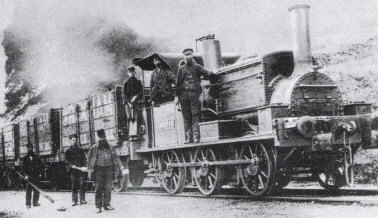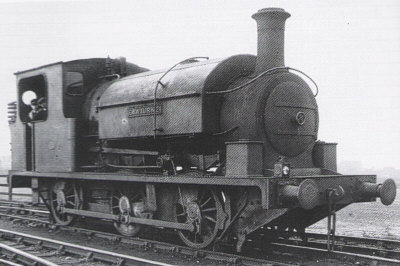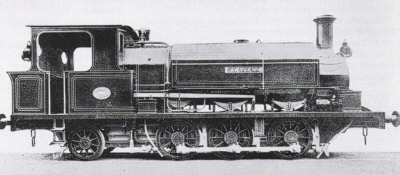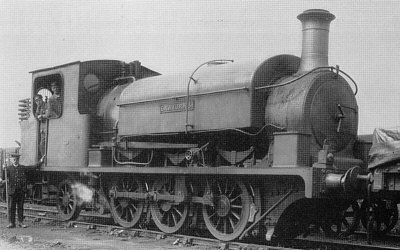EWYUR: Locomotives and Rolling Stock
Locomotives
There was a loose interchange of locomotives between the collieries and the E&WYUR. The E&WYUR is known to have actually owned ten different locomotives, most of which were large Manning Wardle tank engines. Six survived into LNER ownership as classes J84, J85, and N19. Note that the J84 and J85 designations were re-used and had been previously allocated to two Wheatley 0-6-0T classes (J84 and J85).
Little is known about the liveries used. E&WYUR records describe Henrietta as "Green Locomotive No. 21". There are also accounts of some quite colourful liveries which seem unlikely for a colliery line. Most of the surviving photographs do not show lining.
Here are the locomotives in order of acquisition:

Manning Wardle 0-6-0ST Works No. 21 Henrietta
This locomotive was built in 1861 for J&J Charlesworth, and was sold to the E&WYUR in 1894. It was built to the standard Manning Wardle "Old Class I" design with 11x17in inside cylinders and 3ft 1in wheels. It was eventually sold to Meakin & Dean of Birkenhead at an unknown date (possibly 1895?), and eventually made its way to the Minera Mining Company (see photograph).

No. 1, Manning Wardle 0-6-0ST Works No. 1307
No. 2, Manning Wardle 0-6-0ST Works No. 1308
These two locomotives were purchased new in 1895, to the same design with 17x24in inside cylinders and 4ft wheels. Manning Wardle classed both locomotives as "standard gauge 17 inch specials". Both survived into LNER ownership as Class J84. No. 1 became LNER No. 3112 and was quickly withdrawn in 1923. No. 2 became LNER No. 3113 and lasted until 1928.
No. 3, Manning Wardle 0-6-0ST Works No. 1325
This locomotive was purchased new in 1896. Built to Manning Wardle's "Class O" design, it had 15x22in inside cylinders and 3ft 6in wheels. It had a short life with the E&WYUR and was sold to Wath Main Colliery in 1899.

No. 4, Manning Wardle 0-6-2ST Works No. 1398
This locomotive was purchased new in 1898. It had 17x24in inside cylinders and 4ft wheels. Manning Wardle also classed this locomotive as a "standard gauge 17 inch special". Manning Wardle records note that the trailing axle journals were made too long by mistake, and that special collars had to be fitted to the inside of the axleboxes. It was rebuilt as an 0-6-0ST in 1919, and survived into LNER ownership as J85 No. 3114. It was withdrawn from service in 1933.

No. 5, Manning Wardle 0-6-2ST Works No. 1433
No. 6, Manning Wardle 0-6-2ST Works No. 1434
These two locomotives were purchased in 1899 to the same design as No. 4 (17x24in inside cylinders and 4ft wheels). However, they were not rebuilt, and entered LNER service as Class N19. No. 5 became LNER No. 3115 and was withdrawn in 1923. No. 6 became LNER No. 3116 and was withdrawn in 1928.
No. 7 Brothers, Hudswell Clarke 0-6-0ST Works No. 362
This locomotive was purchased in 1889. It had 14x22in outside cylinders and 3ft 9in wheels. This locomotive appears to have passed back and forth between Charlesworth and the E&WYUR. Withdrawal date is unknown, but it was not on the E&WYUR books at Grouping (1923).
No. 3, Manning Wardle 0-6-0ST Works No. 1489
This locomotive was built in 1900 to the same design as Nos. 1 & 2 (17x24in inside cylinders and 4ft wheels). It took the number '3', which had been vacated by the locomotive sold to Wath Main in the previous year. It survived into LNER ownership as Class J84 but was withdrawn in 1923 before it received an LNER number.
No. 8, 0-4-0T Black Hawthorne
Little is known about this locomotive, other than it had 12x19in cylinders. It appears to have been used for shunting at Stourton. It was sold in April 1906.
Coaching Stock
The E&WYUR only required coaching stock for the short lived passenger service. This service used stock hired from the Midland Railway. The coaches were probably six-wheeled coaches, of which the Midland Railway had a surplus of in the Leeds area. No known photographs exist and it is unknown if they were specially lettered for the service or not.
Wagons
The E&WYUR had a large fleet of open wagons for hauling coal and stone traffic. These were to a standard 5 plank open coal truck design built by the Birmingham Carriage and Wagon Company. These wagons appear to have been painted dark grey with white lettering.
The Birmingham Carriage and Wagon Company also supplied a guards van with an unusual glassed-in vernadah.
Acknowledgements
Thank you to George Moffat for the above locomotive photographs and some of the locomotive information.